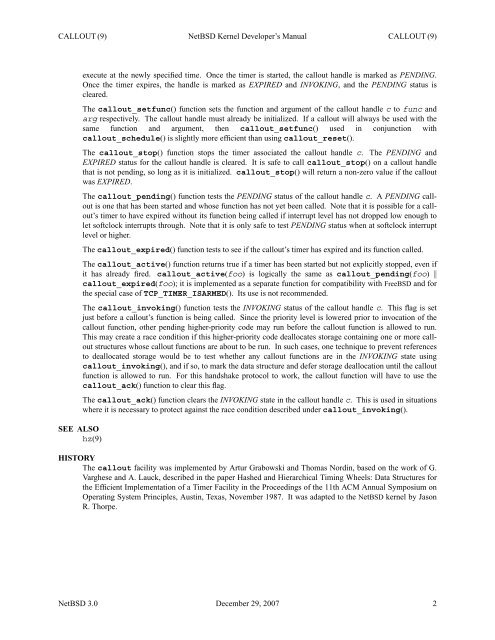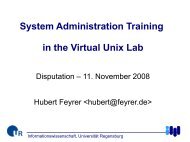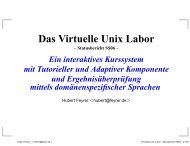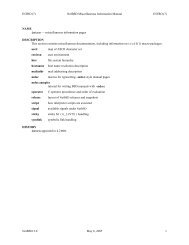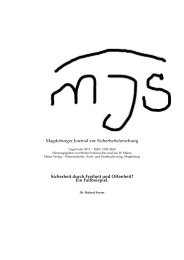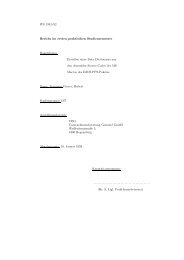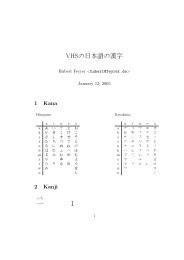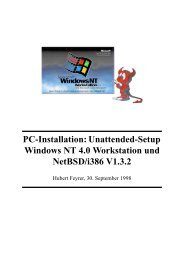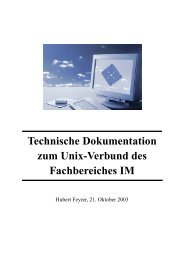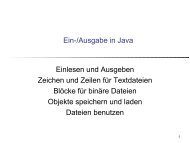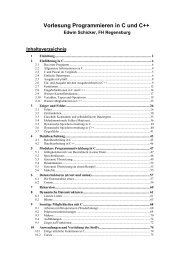- Page 1 and 2:
INTRO(9) NetBSD Kernel Developer’
- Page 3 and 4:
INTRO(9) NetBSD Kernel Developer’
- Page 5 and 6:
INTRO(9) NetBSD Kernel Developer’
- Page 7 and 8:
KASSERT(9) NetBSD Kernel Developer
- Page 9 and 10:
RUN_ONCE (9) NetBSD Kernel Develope
- Page 11 and 12:
ALTQ (9) NetBSD Kernel Developer’
- Page 13 and 14:
ALTQ (9) NetBSD Kernel Developer’
- Page 15 and 16:
ALTQ (9) NetBSD Kernel Developer’
- Page 17 and 18:
ALTQ (9) NetBSD Kernel Developer’
- Page 19 and 20:
ARP (9) NetBSD Kernel Developer’s
- Page 21 and 22:
AUDIO (9) NetBSD Kernel Developer
- Page 23 and 24:
AUDIO (9) NetBSD Kernel Developer
- Page 25 and 26: AUDIO (9) NetBSD Kernel Developer
- Page 27: AUTOCONF (9) NetBSD Kernel Develope
- Page 31 and 32: BCDTOBIN (9) NetBSD Kernel Develope
- Page 33 and 34: BCOPY (9) NetBSD Kernel Developer
- Page 35 and 36: BIOSCALL (9) NetBSD/i386 Kernel Dev
- Page 37 and 38: BITMASK_SNPRINTF (9) NetBSD Kernel
- Page 39 and 40: BLUETOOTH (9) NetBSD Kernel Develop
- Page 41 and 42: BLUETOOTH (9) NetBSD Kernel Develop
- Page 43 and 44: BUFFERCACHE (9) NetBSD Kernel Devel
- Page 45 and 46: BUFFERCACHE (9) NetBSD Kernel Devel
- Page 47 and 48: BUFQ (9) NetBSD Kernel Developer’
- Page 49 and 50: BUS_DMA (9) NetBSD Kernel Developer
- Page 51 and 52: BUS_DMA (9) NetBSD Kernel Developer
- Page 53 and 54: BUS_DMA (9) NetBSD Kernel Developer
- Page 55 and 56: BUS_DMA (9) NetBSD Kernel Developer
- Page 57 and 58: BUS_SPACE(9) NetBSD Kernel Develope
- Page 59 and 60: BUS_SPACE(9) NetBSD Kernel Develope
- Page 61 and 62: BUS_SPACE(9) NetBSD Kernel Develope
- Page 63 and 64: BUS_SPACE(9) NetBSD Kernel Develope
- Page 65 and 66: BUS_SPACE(9) NetBSD Kernel Develope
- Page 67 and 68: BUS_SPACE(9) NetBSD Kernel Develope
- Page 69 and 70: BUS_SPACE(9) NetBSD Kernel Develope
- Page 71 and 72: BUS_SPACE(9) NetBSD Kernel Develope
- Page 73 and 74: BUS_SPACE(9) NetBSD Kernel Develope
- Page 75: BZERO(9) NetBSD Kernel Developer’
- Page 79 and 80: CARDBUS (9) NetBSD Kernel Developer
- Page 81 and 82: CARDBUS (9) NetBSD Kernel Developer
- Page 83 and 84: CNMAGIC (9) NetBSD Kernel Developer
- Page 85 and 86: CONDVAR(9) NetBSD Kernel Developer
- Page 87 and 88: CONDVAR(9) NetBSD Kernel Developer
- Page 89 and 90: CONFIG (9) NetBSD Kernel Developer
- Page 91 and 92: CONFIG (9) NetBSD Kernel Developer
- Page 93 and 94: CONS (9) NetBSD Kernel Developer’
- Page 95 and 96: COPY (9) NetBSD Kernel Developer’
- Page 97 and 98: CPU_CONFIGURE (9) NetBSD Kernel Dev
- Page 99 and 100: CPU_DUMPCONF (9) NetBSD Kernel Deve
- Page 101 and 102: CPU_INITCLOCKS (9) NetBSD Kernel De
- Page 103 and 104: CPU_NEED_RESCHED (9) NetBSD Kernel
- Page 105 and 106: CPU_REBOOT(9) NetBSD Kernel Develop
- Page 107 and 108: CPU_STARTUP (9) NetBSD Kernel Devel
- Page 109 and 110: CPU_SWITCHTO(9) NetBSD Kernel Devel
- Page 111 and 112: CSF (9) NetBSD Kernel Developer’s
- Page 113 and 114: CSF (9) NetBSD Kernel Developer’s
- Page 115 and 116: DDC (9) NetBSD Kernel Developer’s
- Page 117 and 118: DISK (9) NetBSD Kernel Developer’
- Page 119 and 120: DISK (9) NetBSD Kernel Developer’
- Page 121 and 122: DISK (9) NetBSD Kernel Developer’
- Page 123 and 124: DISKLABEL (9) NetBSD Kernel Develop
- Page 125 and 126: DMOVER (9) NetBSD Kernel Developer
- Page 127 and 128:
DMOVER (9) NetBSD Kernel Developer
- Page 129 and 130:
DMOVER (9) NetBSD Kernel Developer
- Page 131 and 132:
DO_SETRESUID (9) NetBSD Kernel Deve
- Page 133 and 134:
DOFILEREAD (9) NetBSD Kernel Develo
- Page 135 and 136:
DOSHUTDOWNHOOKS (9) NetBSD Kernel D
- Page 137 and 138:
DRIVER (9) NetBSD Kernel Developer
- Page 139 and 140:
EDID (9) NetBSD Kernel Developer’
- Page 141 and 142:
ERRNO (9) NetBSD Kernel Developer
- Page 143 and 144:
ETHERSUBR (9) NetBSD Kernel Develop
- Page 145 and 146:
EVCNT (9) NetBSD Kernel Developer
- Page 147 and 148:
EVCNT (9) NetBSD Kernel Developer
- Page 149 and 150:
EXTENT (9) NetBSD Kernel Developer
- Page 151 and 152:
EXTENT (9) NetBSD Kernel Developer
- Page 153 and 154:
FETCH (9) NetBSD Kernel Developer
- Page 155 and 156:
FILE (9) NetBSD Kernel Developer’
- Page 157 and 158:
FILEASSOC (9) NetBSD Kernel Develop
- Page 159 and 160:
FILEASSOC (9) NetBSD Kernel Develop
- Page 161 and 162:
FILEDESC (9) NetBSD Kernel Develope
- Page 163 and 164:
FILEDESC (9) NetBSD Kernel Develope
- Page 165 and 166:
FIRMLOAD (9) NetBSD Kernel Develope
- Page 167 and 168:
FORK1 (9) NetBSD Kernel Developer
- Page 169 and 170:
FSETOWN(9) NetBSD Kernel Developer
- Page 171 and 172:
FSTRANS (9) NetBSD Kernel Developer
- Page 173 and 174:
GETIOBUF (9) NetBSD Kernel Develope
- Page 175 and 176:
HASH (9) NetBSD Kernel Developer’
- Page 177 and 178:
HASHINIT (9) NetBSD Kernel Develope
- Page 179 and 180:
HZ (9) NetBSD Kernel Developer’s
- Page 181 and 182:
IEEE80211 (9) NetBSD Kernel Develop
- Page 183 and 184:
IEEE80211_INPUT (9) NetBSD Kernel D
- Page 185 and 186:
IEEE80211_NODE (9) NetBSD Kernel De
- Page 187 and 188:
IEEE80211_NODE (9) NetBSD Kernel De
- Page 189 and 190:
IEEE80211_OUTPUT (9) NetBSD Kernel
- Page 191 and 192:
IEEE80211_RADIOTAP(9) NetBSD Kernel
- Page 193 and 194:
IEEE80211_RADIOTAP(9) NetBSD Kernel
- Page 195 and 196:
IIC (9) NetBSD Kernel Developer’s
- Page 197 and 198:
IIC (9) NetBSD Kernel Developer’s
- Page 199 and 200:
IN_CKSUM (9) NetBSD Kernel Develope
- Page 201 and 202:
IN_GETIFA(9) NetBSD Kernel Develope
- Page 203 and 204:
IOASIC (9) NetBSD Kernel Developer
- Page 205 and 206:
IOASIC (9) NetBSD Kernel Developer
- Page 207 and 208:
IOCTL (9) NetBSD Kernel Developer
- Page 209 and 210:
IOCTL (9) NetBSD Kernel Developer
- Page 211 and 212:
IPKDB (9) NetBSD Kernel Developer
- Page 213 and 214:
ISA (9) NetBSD Kernel Developer’s
- Page 215 and 216:
ISA (9) NetBSD Kernel Developer’s
- Page 217 and 218:
ISA (9) NetBSD Kernel Developer’s
- Page 219 and 220:
ISAPNP (9) NetBSD Kernel Developer
- Page 221 and 222:
ISR_ADD (9) NetBSD/sun3 Kernel Deve
- Page 223 and 224:
ITIMERFIX (9) NetBSD Kernel Develop
- Page 225 and 226:
KAUTH (9) NetBSD Kernel Developer
- Page 227 and 228:
KAUTH (9) NetBSD Kernel Developer
- Page 229 and 230:
KAUTH (9) NetBSD Kernel Developer
- Page 231 and 232:
KAUTH (9) NetBSD Kernel Developer
- Page 233 and 234:
KAUTH (9) NetBSD Kernel Developer
- Page 235 and 236:
KAUTH (9) NetBSD Kernel Developer
- Page 237 and 238:
KAUTH (9) NetBSD Kernel Developer
- Page 239 and 240:
KCOPY (9) NetBSD Kernel Developer
- Page 241 and 242:
KFILTER_REGISTER (9) NetBSD Kernel
- Page 243 and 244:
KMEM_FREE (9) NetBSD Kernel Develop
- Page 245 and 246:
KNOTE (9) NetBSD Kernel Developer
- Page 247 and 248:
KPREEMPT (9) NetBSD Kernel Develope
- Page 249 and 250:
KPRINTF (9) NetBSD Kernel Developer
- Page 251 and 252:
KTHREAD (9) NetBSD Kernel Developer
- Page 253 and 254:
LINEDISC (9) NetBSD Kernel Develope
- Page 255 and 256:
LOG (9) NetBSD Kernel Developer’s
- Page 257 and 258:
LTSLEEP (9) NetBSD Kernel Developer
- Page 259 and 260:
M_TAG (9) NetBSD Kernel Developer
- Page 261 and 262:
MALLOC (9) NetBSD Kernel Developer
- Page 263 and 264:
MALLOC (9) NetBSD Kernel Developer
- Page 265 and 266:
MB (9) NetBSD Kernel Developer’s
- Page 267 and 268:
MBUF (9) NetBSD Kernel Developer’
- Page 269 and 270:
MBUF (9) NetBSD Kernel Developer’
- Page 271 and 272:
MBUF (9) NetBSD Kernel Developer’
- Page 273 and 274:
MBUF (9) NetBSD Kernel Developer’
- Page 275 and 276:
MCA (9) NetBSD Kernel Developer’s
- Page 277 and 278:
MEMCMP (9) NetBSD Kernel Developer
- Page 279 and 280:
MEMMOVE (9) NetBSD Kernel Developer
- Page 281 and 282:
MEMORYALLOCATORS (9) NetBSD Kernel
- Page 283 and 284:
MI_SWITCH (9) NetBSD Kernel Develop
- Page 285 and 286:
MICROSEQ (9) NetBSD Kernel Develope
- Page 287 and 288:
MICROSEQ (9) NetBSD Kernel Develope
- Page 289 and 290:
MICROSEQ (9) NetBSD Kernel Develope
- Page 291 and 292:
MICROTIME (9) NetBSD Kernel Develop
- Page 293 and 294:
MSTOHZ (9) NetBSD Kernel Developer
- Page 295 and 296:
MUTEX (9) NetBSD Kernel Developer
- Page 297 and 298:
NAMECACHE (9) NetBSD Kernel Develop
- Page 299 and 300:
NAMECACHE (9) NetBSD Kernel Develop
- Page 301 and 302:
NAMEI (9) NetBSD Kernel Developer
- Page 303 and 304:
NAMEI (9) NetBSD Kernel Developer
- Page 305 and 306:
OPENCRYPTO(9) NetBSD Kernel Develop
- Page 307 and 308:
OPENCRYPTO(9) NetBSD Kernel Develop
- Page 309 and 310:
OPENCRYPTO(9) NetBSD Kernel Develop
- Page 311 and 312:
OPTSTR (9) NetBSD Kernel Developer
- Page 313 and 314:
PCI (9) NetBSD Kernel Developer’s
- Page 315 and 316:
PCI (9) NetBSD Kernel Developer’s
- Page 317 and 318:
PCI (9) NetBSD Kernel Developer’s
- Page 319 and 320:
PCI (9) NetBSD Kernel Developer’s
- Page 321 and 322:
PCI_CONFIGURE_BUS (9) NetBSD Kernel
- Page 323 and 324:
PCI_INTR (9) NetBSD Kernel Develope
- Page 325 and 326:
PCKBPORT(9) NetBSD Kernel Developer
- Page 327 and 328:
PCKBPORT(9) NetBSD Kernel Developer
- Page 329 and 330:
PCMCIA (9) NetBSD Kernel Developer
- Page 331 and 332:
PCMCIA (9) NetBSD Kernel Developer
- Page 333 and 334:
PCMCIA (9) NetBSD Kernel Developer
- Page 335 and 336:
PFIL (9) NetBSD Kernel Developer’
- Page 337 and 338:
PHYSIO (9) NetBSD Kernel Developer
- Page 339 and 340:
PMAP (9) NetBSD Kernel Developer’
- Page 341 and 342:
PMAP (9) NetBSD Kernel Developer’
- Page 343 and 344:
PMAP (9) NetBSD Kernel Developer’
- Page 345 and 346:
PMAP (9) NetBSD Kernel Developer’
- Page 347 and 348:
PMAP (9) NetBSD Kernel Developer’
- Page 349 and 350:
PMAP (9) NetBSD Kernel Developer’
- Page 351 and 352:
PMC (9) NetBSD Kernel Developer’s
- Page 353 and 354:
PMC (9) NetBSD Kernel Developer’s
- Page 355 and 356:
PMF (9) NetBSD Kernel Developer’s
- Page 357 and 358:
PMF (9) NetBSD Kernel Developer’s
- Page 359 and 360:
POOL (9) NetBSD Kernel Developer’
- Page 361 and 362:
POOL (9) NetBSD Kernel Developer’
- Page 363 and 364:
POOL_CACHE (9) NetBSD Kernel Develo
- Page 365 and 366:
POWERHOOK_ESTABLISH (9) NetBSD Kern
- Page 367 and 368:
PPI (9) NetBSD Kernel Developer’s
- Page 369 and 370:
PREEMPT (9) NetBSD Kernel Developer
- Page 371 and 372:
PROP_COPYIN_IOCTL (9) NetBSD Kernel
- Page 373 and 374:
RADIO (9) NetBSD Kernel Developer
- Page 375 and 376:
RAS (9) NetBSD Kernel Developer’s
- Page 377 and 378:
RASOPS (9) NetBSD Kernel Developer
- Page 379 and 380:
RATECHECK (9) NetBSD Kernel Develop
- Page 381 and 382:
RESETTODR (9) NetBSD Kernel Develop
- Page 383 and 384:
RND (9) NetBSD Kernel Developer’s
- Page 385 and 386:
RSSADAPT (9) NetBSD Kernel Develope
- Page 387 and 388:
RSSADAPT (9) NetBSD Kernel Develope
- Page 389 and 390:
RT_TIMER (9) NetBSD Kernel Develope
- Page 391 and 392:
RWLOCK (9) NetBSD Kernel Developer
- Page 393 and 394:
SCHED_4BSD (9) NetBSD Kernel Develo
- Page 395 and 396:
SCSIPI (9) NetBSD Kernel Developer
- Page 397 and 398:
SCSIPI (9) NetBSD Kernel Developer
- Page 399 and 400:
SCSIPI (9) NetBSD Kernel Developer
- Page 401 and 402:
SECMODEL (9) NetBSD Kernel Develope
- Page 403 and 404:
SECMODEL (9) NetBSD Kernel Develope
- Page 405 and 406:
SECMODEL (9) NetBSD Kernel Develope
- Page 407 and 408:
SECMODEL_BSD44 (9) NetBSD Kernel De
- Page 409 and 410:
SECMODEL_BSD44 (9) NetBSD Kernel De
- Page 411 and 412:
SELECT (9) NetBSD Kernel Developer
- Page 413 and 414:
SHUTDOWNHOOK_ESTABLISH (9) NetBSD K
- Page 415 and 416:
SIGNAL (9) NetBSD Kernel Developer
- Page 417 and 418:
SIGNAL (9) NetBSD Kernel Developer
- Page 419 and 420:
SIGNAL (9) NetBSD Kernel Developer
- Page 421 and 422:
SOFTINT (9) NetBSD Kernel Developer
- Page 423 and 424:
SPL (9) NetBSD Kernel Developer’s
- Page 425 and 426:
SPLRAISEIPL (9) NetBSD Kernel Devel
- Page 427 and 428:
SUSPENDSCHED (9) NetBSD Kernel Deve
- Page 429 and 430:
SYSCTL (9) NetBSD Kernel Developer
- Page 431 and 432:
SYSCTL (9) NetBSD Kernel Developer
- Page 433 and 434:
SYSCTL (9) NetBSD Kernel Developer
- Page 435 and 436:
SYSMON_ENVSYS (9) NetBSD Kernel Dev
- Page 437 and 438:
SYSMON_ENVSYS (9) NetBSD Kernel Dev
- Page 439 and 440:
SYSMON_ENVSYS (9) NetBSD Kernel Dev
- Page 441 and 442:
TC (9) NetBSD Kernel Developer’s
- Page 443 and 444:
TC (9) NetBSD Kernel Developer’s
- Page 445 and 446:
TIME_SECOND (9) NetBSD Kernel Devel
- Page 447 and 448:
TODR (9) NetBSD Kernel Developer’
- Page 449 and 450:
UCOM (9) NetBSD Kernel Developer’
- Page 451 and 452:
UCOM (9) NetBSD Kernel Developer’
- Page 453 and 454:
UIOMOVE (9) NetBSD Kernel Developer
- Page 455 and 456:
USBDI (9) NetBSD Kernel Developer
- Page 457 and 458:
USBDI (9) NetBSD Kernel Developer
- Page 459 and 460:
UVM (9) NetBSD Kernel Developer’s
- Page 461 and 462:
UVM (9) NetBSD Kernel Developer’s
- Page 463 and 464:
UVM (9) NetBSD Kernel Developer’s
- Page 465 and 466:
UVM (9) NetBSD Kernel Developer’s
- Page 467 and 468:
UVM (9) NetBSD Kernel Developer’s
- Page 469 and 470:
UVM (9) NetBSD Kernel Developer’s
- Page 471 and 472:
VATTR (9) NetBSD Kernel Developer
- Page 473 and 474:
VCONS (9) NetBSD Kernel Developer
- Page 475 and 476:
VERIEXEC (9) NetBSD Kernel Develope
- Page 477 and 478:
VERIEXEC (9) NetBSD Kernel Develope
- Page 479 and 480:
VFS_HOOKS (9) NetBSD Kernel Develop
- Page 481 and 482:
VFSOPS (9) NetBSD Kernel Developer
- Page 483 and 484:
VFSOPS (9) NetBSD Kernel Developer
- Page 485 and 486:
VFSSUBR (9) NetBSD Kernel Developer
- Page 487 and 488:
VME (9) NetBSD Kernel Developer’s
- Page 489 and 490:
VME (9) NetBSD Kernel Developer’s
- Page 491 and 492:
VMEM (9) NetBSD Kernel Developer’
- Page 493 and 494:
VMEM_CREATE (9) NetBSD Kernel Devel
- Page 495 and 496:
VMEM_FREE (9) NetBSD Kernel Develop
- Page 497 and 498:
VMEM_XFREE (9) NetBSD Kernel Develo
- Page 499 and 500:
VNFILEOPS (9) NetBSD Kernel Develop
- Page 501 and 502:
VNODE (9) NetBSD Kernel Developer
- Page 503 and 504:
VNODE (9) NetBSD Kernel Developer
- Page 505 and 506:
VNODE (9) NetBSD Kernel Developer
- Page 507 and 508:
VNODE (9) NetBSD Kernel Developer
- Page 509 and 510:
VNODEOPS (9) NetBSD Kernel Develope
- Page 511 and 512:
VNODEOPS (9) NetBSD Kernel Develope
- Page 513 and 514:
VNODEOPS (9) NetBSD Kernel Develope
- Page 515 and 516:
VNODEOPS (9) NetBSD Kernel Develope
- Page 517 and 518:
VNODEOPS (9) NetBSD Kernel Develope
- Page 519 and 520:
VNODEOPS (9) NetBSD Kernel Develope
- Page 521 and 522:
VNODEOPS (9) NetBSD Kernel Develope
- Page 523 and 524:
VNSUBR (9) NetBSD Kernel Developer
- Page 525 and 526:
WDC (9) NetBSD Kernel Developer’s
- Page 527 and 528:
WDC (9) NetBSD Kernel Developer’s
- Page 529 and 530:
WORKQUEUE (9) NetBSD Kernel Develop
- Page 531 and 532:
WORKQUEUE_DESTROY (9) NetBSD Kernel
- Page 533 and 534:
WSCONS (9) NetBSD Kernel Developer
- Page 535 and 536:
WSDISPLAY(9) NetBSD Kernel Develope
- Page 537 and 538:
WSDISPLAY(9) NetBSD Kernel Develope
- Page 539 and 540:
WSFONT (9) NetBSD Kernel Developer
- Page 541 and 542:
WSFONT (9) NetBSD Kernel Developer
- Page 543 and 544:
WSKBD (9) NetBSD Kernel Developer
- Page 545 and 546:
WSKBD (9) NetBSD Kernel Developer
- Page 547 and 548:
WSMOUSE (9) NetBSD Kernel Developer


